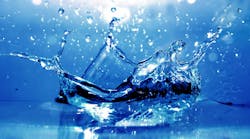By Patrick Crow, Washington Correspondent
The American Water Works Association (AWWA) has urged that water systems be eligible for funding through a federal infrastructure bank proposed by President Barack Obama.
Congress is not expected to pass such legislation during the planned Lame Duck session this year.
Although President Obama's message focused on transportation spending, AWWA Executive Director David LaFrance said, "There are more than one million miles of water mains buried beneath our roads, stretching 20 times the length of our interstate highways. Much of our water infrastructure was constructed between 80 and 100 years ago and is nearing the end of its functional lifespan.
"While transportation funding is important, our water systems, although out of sight, cannot be overlooked. These systems are critical for the public health protection, fire protection, economic prosperity and our overall quality of life."
AMWA said the bank would borrow money through the U.S. Treasury at low rates and provide low-cost loans for water projects. It said, "Because the bank would issue loans -- not grants -- it would have minimal impact on the federal budget and would require no new taxes. It's a fresh, sustainable approach to financing our nation's aging water infrastructure problem that strikes just the right balance between federal assistance and local responsibility."
The association later urged leaders of the Senate Banking, Housing, and Urban Affairs Committee not to overlook the water sector in discussions of the proposed bank.
AWWA noted that the Drinking Water State Revolving Fund program is primarily targeted at providing assistance to small water systems, leaving many metropolitan utilities with little funding assistance.
Meanwhile, the National Association of Clean Water Agencies (NACWA) urged President Obama to include clean water funding in a possible $50 billion economic stimulus bill.
NACWA observed that EPA has estimated the nation needs nearly $300 billion for wastewater and stormwater projects over the next 20 years to comply with the Clean Water Act. Also, there is a $500 billion gap between current investment and projected needs in water infrastructure needs over the next 20 years.
Lead Rules
Key senators have introduced a bill toughening rules against lead in drinking water.
Senators Barbara Boxer (D-Calif.), chairman of the Environment and Public Works Committee, Dianne Feinstein (D-Calif.), Amy Klobuchar (D-Minn.), Benjamin Cardin (D-Md.), Bernard Sanders (I-Vt.), and Kirsten Gillibrand (D-N.Y.) filed the bill.
In the House of Representatives, Anna Eshoo (D-Calif.) previously introduced a similar bill that became part of the Assistance, Quality, and Affordability Act (H.R. 5320), which was passed July 29.
The senators said lead is a toxic contaminant that can harm the human nervous system and brain development. Federal law allows plumbing fixtures that carry drinking water to contain up to 8% lead. Under the Senate bill, the wetted surface of such plumbing cannot contain more than a weighted average of 0.25%.
Sen. Boxer said, "The bottom line is that there is no safe level of lead -- a toxic heavy metal -- in our drinking water."
Sen. Cardin noted that industry now is able to make plumbing products containing less lead. Sen. Sanders said Vermont has already enacted a strong standard against lead in drinking water.
Fresh Water Study
The Obama Administration has received a study detailing the challenges in providing fresh water.
The White House Council on Environmental Quality accepted the document prepared by the Johnson Foundation at Wingspread, of Racine, WI. The Water Environment Federation (WEF) was among various groups supporting its conclusions.
Sponsors said the study, "Charting New Waters: A Call to Action to Address U.S. Freshwater Challenges," is believed to be the first comprehensive, cross-sector examination of its kind.
The report identified problems such as pollution and scarcity; competing urban, rural and ecosystem water needs; climate change; environmental and public health impacts; and a variety of economic implications. It offered actions to confront those threats and a plan to ensure that freshwater resources would be adequate.
It recommended coordinated regulations by federal, state and local jurisdictions. It also said the freshwater regulatory framework, which was developed in the 1970s to deal with the environmental issues of that era, should be modernized.
WEF President Paul Freedman said, "With aging infrastructure, growing populations and climate change, water will become the defining societal and environmental challenge of the twenty-first century. We need to rethink our twentieth century approaches to find sustainable solutions. The Freshwater Call to Action not only identifies key challenges but presents important recommendations that will move us towards these solutions."
In other Washington news:
- The House of Representatives has passed a bill to make it easier for communities to establish pharmaceutical take-back programs, which could reduce the amount of unused drugs flushed in toilets. The Senate has approved a similar bill.
- EPA has awarded Topeka, Kan., $485,000 toward $3.2 million in projects. A drinking water project would install 9,500 feet of 18-inch line and 925 feet of 24-inch line. A sanitary sewer project will include 3,375 feet of 18-inch pipe and 2,100 feet of 15-inch pipe.
- The agency cited the Montgomery, Ala., Water Works and Sanitary Sewer Board and the Hendersonville, Tenn., Utility District, for allowing unauthorized discharges of sewage in August.
- EPA has begun to award grants under the administration's Great Lakes Restoration Initiative, which targeted the most significant environmental problems in the region. The Great Lakes provide 30 million Americans with drinking water.
- Majority Leader Harry Reid (D-Nev.) has decided the Senate will debate climate change and energy legislation this year. The bill would include provisions to help water and wastewater systems adapt to climate change.
- EPA is drafting a rule to reduce mercury waste from dental offices. Dental amalgams, or fillings containing mercury, account for 3.7 tons of mercury discharged each year. EPA expects to propose a rule next year and finalize it in 2012.
- The Department of Agriculture has granted $445.3 million for 89 water and wastewater infrastructure projects in small communities under the American Recovery and Reinvestment Act.
- EPA has asked nine oil industry service companies to provide data on the hydraulic fracturing of natural gas wells. Congress has ordered the agency to determine if the practice has affected drinking water and public health. WW
More WaterWorld Current Issue Articles
More WaterWorld Archives Issue Articles


